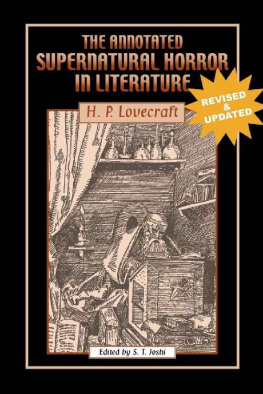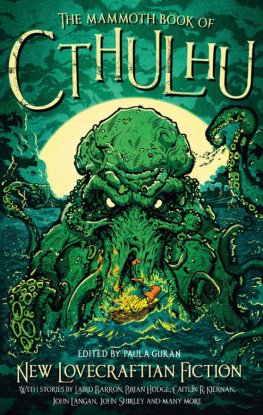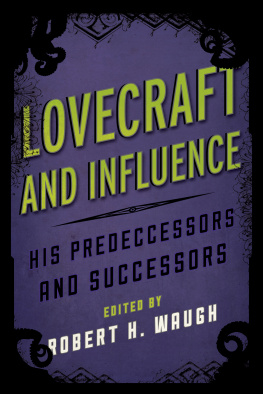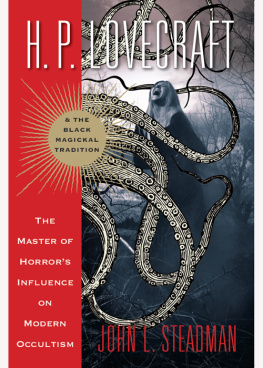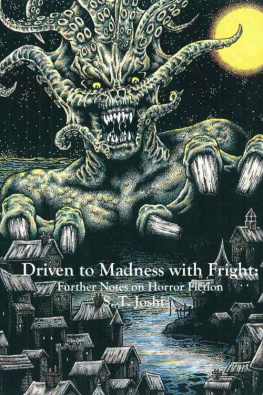H. P. Lovecraft - At the Mountains of Madness: The Definitive Edition
Here you can read online H. P. Lovecraft - At the Mountains of Madness: The Definitive Edition full text of the book (entire story) in english for free. Download pdf and epub, get meaning, cover and reviews about this ebook. year: 2005, publisher: The Modern Library, genre: Non-fiction. Description of the work, (preface) as well as reviews are available. Best literature library LitArk.com created for fans of good reading and offers a wide selection of genres:
Romance novel
Science fiction
Adventure
Detective
Science
History
Home and family
Prose
Art
Politics
Computer
Non-fiction
Religion
Business
Children
Humor
Choose a favorite category and find really read worthwhile books. Enjoy immersion in the world of imagination, feel the emotions of the characters or learn something new for yourself, make an fascinating discovery.

- Book:At the Mountains of Madness: The Definitive Edition
- Author:
- Publisher:The Modern Library
- Genre:
- Year:2005
- Rating:4 / 5
- Favourites:Add to favourites
- Your mark:
- 80
- 1
- 2
- 3
- 4
- 5
At the Mountains of Madness: The Definitive Edition: summary, description and annotation
We offer to read an annotation, description, summary or preface (depends on what the author of the book "At the Mountains of Madness: The Definitive Edition" wrote himself). If you haven't found the necessary information about the book — write in the comments, we will try to find it.
At the Mountains of Madness: The Definitive Edition — read online for free the complete book (whole text) full work
Below is the text of the book, divided by pages. System saving the place of the last page read, allows you to conveniently read the book "At the Mountains of Madness: The Definitive Edition" online for free, without having to search again every time where you left off. Put a bookmark, and you can go to the page where you finished reading at any time.
Font size:
Interval:
Bookmark:
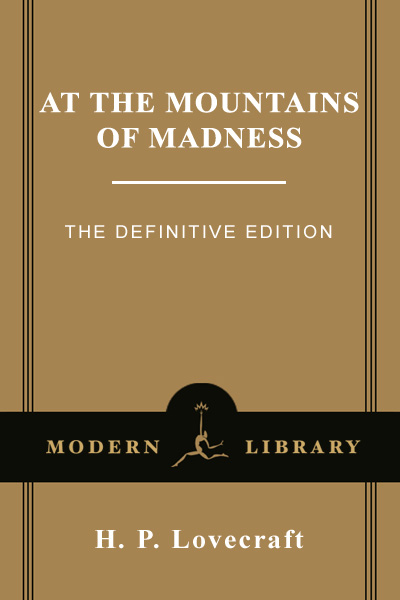
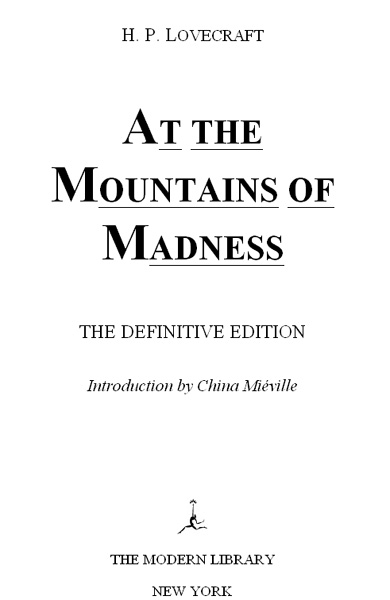

CONTENTS
H. P. LOVECRAFT
Howard Phillips Lovecraft, the visionary writer generally regarded as the mastermind of modern horror fiction, was born in Providence, Rhode Island, on August 20, 1890. The precocious only child of an ill-fated marriage, he endured a cloistered and traumatic upbringing. Lovecraft never knew his father, a traveling salesman of English ancestry who was institutionalized with syphilitic dementia in 1893. He was raised in his birthplace, the Victorian mansion of his maternal grandfather, by an overprotective mother and two maiden aunts. At the age of eight he discovered the stories of Edgar Allan Poe, whose aesthetics marked him forever.
Frequent illnesses disrupted the boys formal schooling, but he devoured books on astronomy and Greek mythology and was enthralled by the poetry of Dryden and Pope. Financial reversals occasioned by his grandfathers death in 1904 forced the family to sell their ancestral home and seek lodgings in a nearby duplex. The move intensified an already claustrophobic relationship with his mother, who instilled in Lovecraft a profound conviction that he was different from other people.
Lovecraft suffered a nervous breakdown in 1908 and over the next five years became as reclusive as any of his eccentric fictional narrators. He gradually emerged from his depression through membership in the United Amateur Press Association (UAPA), a group of fledgling writers who published their own magazines. In addition to contributing poetry and essays to various journals, he put out thirteen issues of his own paper, The Conservative (191523), and began a prolific correspondence with colleagues. The five volumes of his posthumously issued Selected Letters (published 196576) represent some of Lovecrafts most substantial prose and reveal him to be an artist and philosopher of wide-ranging intellect. Lovecraft [was] one of the most exhaustively self-chronicled individuals of his century, says his preeminent interpreter, S. T. Joshi. His letters are the equivalent of a Pepys diary in the exhibition of the fluctuations of his mind and heart.
In 1921, while attending a convention of the UAPA in Boston, Lovecraft met Sonia Greene, a widowed Brooklyn milliner seven years his senior. Their brief, disastrous marriage took him to New York City for two years; his return to Providence in the spring of 1926 prompted the greatest creative outburst of his short career.
The oldest and strongest emotion of mankind is fear, and the oldest and strongest kind of fear is fear of the unknown, observed Lovecraft in his pioneering essay Supernatural Horror in Literature (192527). Guided by this dictum, he produced a relatively small body of fiction: some sixty stories, most of which appeared in the newly founded pulp magazine Weird Tales. Three of themThe Dream-Quest of Unknown Kadath (192627), The Case of Charles Dexter Ward (1927), and At the Mountains of Madness (1931)are generally classified as short novels. Many of Lovecrafts early pieces are innocuous, dreamlike creations heavily influenced by the Irish fantasist Lord Dunsany. In stark contrast are his harrowing tales of terror set against a meticulously described, historically grounded New England landscape. Lovecrafts most acclaimed stories are those in the cycle known as the Cthulhu Mythos. Combining elements of horror and science fiction, they are an extended elaboration of Lovecrafts recurring fantasy that an entire alien civilization lurks on the underside of our known world. Included in the cycle is At the Mountains of Madness, in which an unsuspecting expedition uncovers a city of untold terror buried beneath an Antarctic wasteland. At the Mountains of Madness ranks high among the horror stories of the English language, said Time. Joyce Carol Oates reflected: There is a melancholy, operatic grandeur in Lovecrafts most passionate work, like At the Mountains of Madness; a curious elegiac poetry of unspeakable loss, of adolescent despair and an existential loneliness so pervasive that it lingers in the readers memory, like a dream, long after the rudiments of Lovecraftian plot have faded.
H. P. Lovecraft died of intestinal cancer in Providence on March 15, 1937. Fame accrued to him posthumously, owing chiefly to the efforts of Arkham House Publishers, which brought his writings to a wider audience. Beginning with The Outsider and Others (1939) and Beyond the Wall of Sleep (1943), the firm issued numerous collections of Lovecrafts work. Within a decade of his premature death, Best Supernatural Stories of H. P. Lovecraft (1945) would sell more than sixty-seven thousand hardcover copies in a single year.
Lovecrafts fiction is one of the cornerstones of modern horror... a unique and visionary world of wonder, terror, and delirium, said Clive Barker. [Lovecraft is] the American writer of the twentieth century most frequently compared with Poe, both in the quality of his art [and in] its thematic preoccupations, observed Joyce Carol Oates. [He has] had an incalculable influence on succeeding generations of writers of horror fiction. And Stephen King concluded: H. P. Lovecraft has yet to be surpassed as the twentieth centurys greatest practitioner of the classic horror tale.
INTRODUCTION
China Miville
(WARNING: THIS INTRODUCTION DISCUSSES KEY ELEMENTS OF THE NOVELS PLOT.)
In a much-quoted homage, Stephen King once described H. P. Lovecraft as the twentieth-century horror storys dark and baroque prince. And this is a prince who wields old-school, feudal power: like few other writers before or since, Lovecraft fundamentally defined the shape of his chosen literary field. If anything, in fact, the label prince is inadequate. When one considers the canonical nature of Lovecrafts texts, the awed scholasticism with which his followers discuss his cosmology, and the endless recursion of his ideas and his aesthetics by the faithful, an alternative analogy presents itself: Lovecraft is horrors pope.
But without diminishing the mans peculiar genius, we must see Lovecraft as a product of his time. We can make sense of him, and his astonishing visions, only to the extent that we understand him as defined by the specific horrors, concrete and psychic, of the early twentieth century.
1. THE SURRENDER TO THE WEIRD
Genre writers, it is often claimed, are uninterested in characterization, theme, or nuance, and instead vulgarly subordinate everything to the exigencies of plot. This, of course, is nonsense. In fact, many genre writers dont do plot either.
H. P. Lovecraft is the towering genius among those writers of fantastic fiction for whom plot is simply not the point. For Lovecraft, the point is the weird. Nowhere is this more clear than in the outstanding At the Mountains of Madness, described by one preeminent Lovecraft scholar as a triumph in almost every way. The question concerning Lovecraft is not whether he can or cannot do plot, but whether or not plot and narrative arc are the elements that drive his art.
This is not to say that Lovecrafts stories are clumsy in their craft. Some, like The Statement of Randolph Carter, move tightly and precisely, evoking growing foreboding as the protagonist listens to radio reports from a companion penetrating the horrors of a tomb; others, like the canonical The Call of Cthulhu, deploy the technique of cut-and-paste in a pulp bricolage, aggregating a sense of dread and awe precisely out of the
Next pageFont size:
Interval:
Bookmark:
Similar books «At the Mountains of Madness: The Definitive Edition»
Look at similar books to At the Mountains of Madness: The Definitive Edition. We have selected literature similar in name and meaning in the hope of providing readers with more options to find new, interesting, not yet read works.
Discussion, reviews of the book At the Mountains of Madness: The Definitive Edition and just readers' own opinions. Leave your comments, write what you think about the work, its meaning or the main characters. Specify what exactly you liked and what you didn't like, and why you think so.

